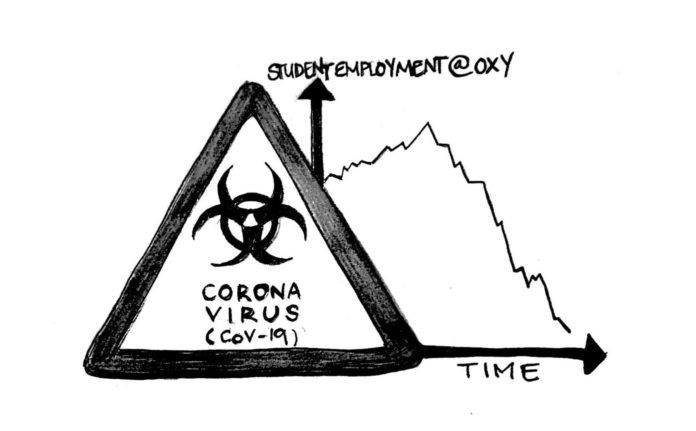Following Occidental’s decision to ask most students to leave campus by March 20 in response to the coronavirus pandemic, very few student employees continue to work in person, according to work supervisors. For students who cannot continue work, only Federal Work Study or Oxy Work Award students will be paid their spring semester allotment, according to an April 3 message sent out by Associate Vice President and Chief Human Resources Officer Randy Glazer. Nina Srdić Hadži-Nešić, Associated Students of Occidental College (ASOC) president, said there are at least one hundred and potentially up to a few hundred work study recipients who cannot continue work and are eligible to receive the allotment.
Srdić Hadži-Nešić said she has been meeting with Amos Himmelstein, vice president and chief operating officer for finance, planning and operations, to advocate increasing the academic year earnings cap used for evaluating reimbursements. The new cap has been increased from $3,100, the maximum work study allowance, to $3,750, the adjusted work study cap due to a rise in minimum wage in July 1, 2019. Srdić Hadži-Nešić said this increase, if implemented, will benefit work study students who are close to exhausting their $3,100 allowance.
“We thought about ‘What about those who almost reached their cap, who have been working so much and so hard throughout the academic year, and maybe they have a few dozen dollars left to reach the $3,100 [cap], what about them?'” Srdić Hadži-Nešić said. “It seems unfair that they have worked the most, but they now get the least.”
Part of the reason why some students are unable to continue work is because all campus gatherings of more than 25 people are cancelled until further notice, according to a March 12 message from President Jonathan Veitch. Marcus Rodriguez, director of the Student Leadership, Involvement and Community Engagement (SLICE) office, said SLICE has suspended all physical programming, on-campus booking and community-based projects. Student program coordinators will no longer work with SLICE. Chamnan Lim, assistant director of administration and programs at the McKinnon Center for Global Affairs, said events featuring distinguished speakers that were planned months in advance had to be cancelled because of the pandemic. However, Lim said some student workers at the Center are able to work remotely by updating the website and creating videos from media captured in the 2020 UN Week.
There are also offices which, because of the physical nature of their work, cannot allow students to work remotely. According to Donna Huebner, Occidental College bookstore manager, the bookstore normally employs 12–13 student workers. Huebner said there used to be separate divisions of labor between the student workers and staff, where the students restock, price and count incoming items and the staff focus on office work such as taking orders from the bookstore website. Now, the bookstore can only employ one student worker because others are too far from Occidental to commute to work. This has forced the bookstore to shorten its business hours, which were formerly 8:30 a.m.–6 p.m. Monday to Thursday, to 10 a.m.–3 p.m. Huebner said this also means the remaining four regular staff at the bookstore need to take on additional responsibilities normally completed by students.
“Some of our regular staff have gone to only coming in a few days a week, so we don’t have that backup like we normally do,” Huebner said. “If I have to go to a meeting, then they have to be at the register and can’t do their work.”
Other college services that rely more heavily on regular staff, such as Campus Dining, are less affected by student workers leaving campus. According to Judy Runyon, director of operations for hospitality services, most Campus Dining student workers work at the Tiger Cooler and Green Bean. Runyon said while the Marketplace remains open, both the Tiger Cooler and the Green Bean are closed because with only around 200 student remaining on campus, it was fiscally unfeasible to keep all dining facilities open.
Kaye Jenkins (junior), Campus Dining lead intern for sustainability, is the only student worker still working in person for Campus Dining, according to Runyon. Jenkins said before March 20, she was working with sustainability-focused student organizations to plan Earth Month, which was supposed to take place in April. Now, she said she is exploring ways to celebrate Earth Month virtually. Jenkins said she finds it difficult to stay focused on work while at home, so she has been going to the Campus Dining office more frequently to help her focus.
“I have my desk at my house. It’s just really difficult to transition from relaxing to class to work when I’m in the same space all day,” Jenkins said. “[In] the first week of remote learning, I barely did work at all. I think I logged three hours, that was super stressed out.”
Jenkins said her supervisors at Campus Dining have been very accommodating, as they allowed her to prioritize move-out related matters over work when President Veitch sent out the March 12 message asking most students to leave campus.
According to Srdić Hadži-Nešić, the administration will continue to run numbers and take various factors into account in order to reach a final decision on the reimbursement for work study students. Such factors might include the possibility of more students needing financial aid and less enrollment in the class of 2024, all of which will impact the amount Occidental can pay work study students. Srdić Hadži-Nešić said once the college informs eligible work study students their allotment amount, they have the right to ask the financial aid and business offices how their number was calculated.
![]()































